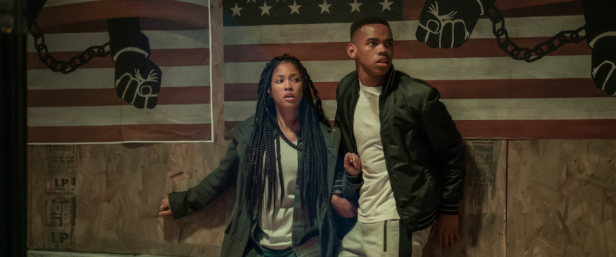With the third film in the lucrative horror franchise ending on the election of a Hillary Clinton-esque figure promising to cancel the Purge — the annual 12 hours of lawlessness in America where all crime is legal — the series could only look backwards. This prequel answers many of the questions that such an insane concept raises, but exposition is the best thing the new film has to offer.
The most distinctive aspect of the series so far has been the fact that its horrible conceit is justified by the power figures in its world as being economically sound. By the third film, it has been made clear that the Purge was in fact established in order to rid the population of those who only cost money to the state and do not contribute enough — namely, the poor.
This ‘justification’ was only a rumour in the previous three films, promoted first by an anti-Purge group and then a liberal presidential candidate. But what was only subtext then is now the narrative thrust of the new film. Most of the citizens within the previous films didn’t want to believe that their government could care so little about its citizens or could be so openly racist — of course this is about racism, because killing minorities is cheaper than helping them. But in 2018, this idea and the thinly veiled hatred of elected officials for certain members of the population do not seem so far-fetched and ridiculous anymore.
The timing for this dystopian satire couldn’t be more perfect. But maybe this is why, when a government official on screen finally spells out this inhumane ‘justification’ for the Purge, the horror of the film feels a little too close to home. The film indeed seems torn between the (now) quite realistic roots and ramifications of its concept, the seriousness of its socio-economic commentary, and its understandable desire to be a fun horror movie with brutal kills and thrilling hijinks.
The film opens in a decidedly realist register, with the set-up of the Purge experiment underlining the way economic desperation can drive people to danger. Citizens of Staten Island, where the limited experiment takes place, are offered $5,000 to stay in the city during the Purge, and even more money if they accept to actively participate and commit crimes. Most of these people are lower-class POC who need money to survive, and they all naturally reply “yes” when scientists ask them “are you angry?” They have all reason to be.
Ironically, one of the characters we follow has the opposite problem. Dmitri (Y’lan Noel), the leader of a drug gang, is afraid that the purge will interfere with his business. The film is smart enough to show the nuances of violence in America: except for Dmitri’s shocking but narratively incoherent murder of a rival gangster, it is clear that the violence of the street gangs is not at all like that of the Purge. From a moral standpoint, everyone participating in the experiment is already dead, lead into a deadly situation by a government that plays on the economic desperation it itself has created. In the gangs, a few people like Dmitri can actually ‘make it’. This distinction is reinforced when the organisers literally turn against all participants, and Dmitri against them.
It is in that decisive final act that the movie ultimately fails. In the first film, the surviving matriarch of the household decided not to kill the neighbour who wanted to murder her entire family. Similarly in the third installment, the presidential candidate who had her family ‘purged’ in front of her did not kill the man responsible, but rather made it her mission to cancel the Purge altogether. In the final scenes of this movie, Dmitri is acting in legitimate defence. But the first film never tried to make Ethan Hawke look cool while he was defending himself. Dmitri, by contrast, basically walks away from explosions, fashioned suddenly as a kind of black Rambo or John McClane with rippling muscles and heavy artillery.
A horror film based on the juvenile premise “what if all crime was legal for 12 hours?” could well have had its characters gleefully enact gratuitous murders only to be embroiled in unending cycles of revenge and aestheticised carnage, but this was never the direction of the franchise. From the start, the Purge films opted for a semi-realist tone and structure based on the very idea that revenge and murder were never cool. So why should we cheer at Dmitri simply trying to survive, doing what no one should ever have to do — kill? This ideologically muddled film flounders in both its attempts at legitimate satire and commentary, and in its stylised relish for retributive violence precisely because it never settles for a consistent perspective.
